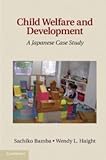Child welfare and development : a Japanese case study / Sachiko Bamba, Wendy L. Haight.
Publication details: Cambridge, U. K. : Cambridge University Press, 2011.Description: vii, 215 p. : ill. ; 24 cmISBN:- 9781107002845 (hbk.)
- 1107002842 (hbk.)
| Item type | Current library | Home library | Collection | Call number | Materials specified | Copy number | Status | Date due | Barcode | |
|---|---|---|---|---|---|---|---|---|---|---|
| AM | PERPUSTAKAAN TUN SERI LANANG | PERPUSTAKAAN TUN SERI LANANG KOLEKSI AM-P. TUN SERI LANANG (ARAS 5) | - | HV6626.54.J3B364 (Browse shelf(Opens below)) | 1 | Available | 00002092691 |
Includes bibliographical references and index.
'Bamba and Haight provide an in-depth understanding of the everyday experiences and perspectives of maltreated children and their substitute caregivers and teachers in Japan. Their innovative research program combines strategies from developmental psychology, ethnography and action research. Although child advocates from around the world share certain goals and challenges, there is substantial cultural variation in how child maltreatment is understood, its origins, impact on children and families, as well as societal responses deemed appropriate. The authors step outside of the Western cultural context to illustrate creative ecologically- and developmentally-based strategies for supporting the psychosocial well-being of maltreated children in state care, provide an alternative but complementary model to the prevalent large-scale survey strategies for conducting international research in child welfare, and provide a resource for educators to enhance the international content of human development, education, social work and child welfare courses'--Provided by publisher.
'Sachiko Bamba and Wendy L. Haight provide an in-depth understanding of the everyday experiences and perspectives of maltreated children and their substitute caregivers and teachers in Japan. Th eir innovative research program combines strategies from developmental psychology, ethnography, and intervention- oriented research. Although child advocates from around the world share certain goals and challenges, there is substantial cultural variation in how child maltreatment is understood, its origins, impact on children and families, as well as societal responses deemed appropriate. Th e authors step outside of the western cultural context to illustrate creative ecologically and developmentally based strategies for supporting the psychosocial well-being of maltreated children in state care, provide an alternative but complementary model to the prevalent large-scale survey strategies for conducting international research in child welfare, and provide a resource for educators to enhance the international content of human development, education, social work, and child welfare courses'--Provided by publisher.
There are no comments on this title.

